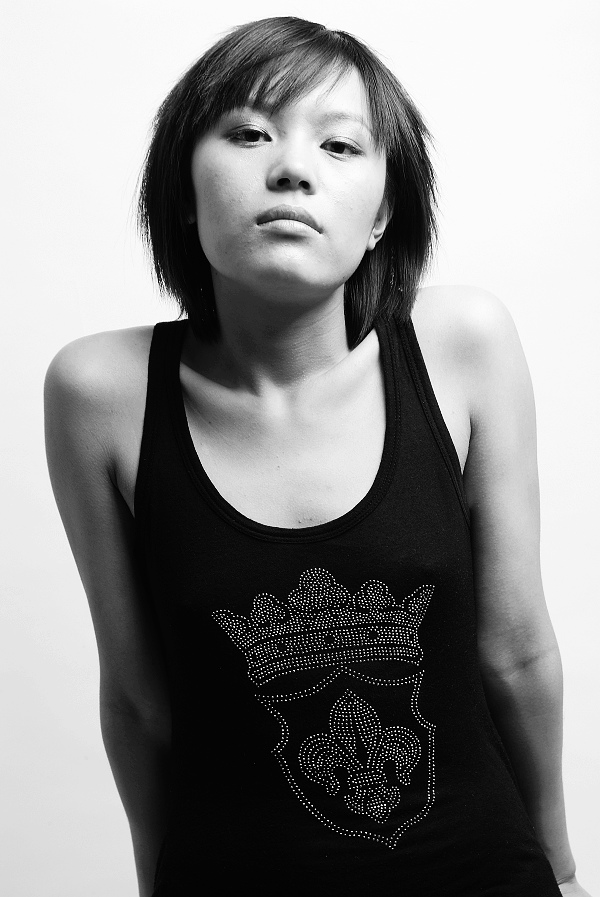关于本人
春树,本名邹楠,1983年出生,中国当代中国作家、诗人,中国大陆80后代表人物之一。2004年2月作为作家登上美国《时代周刊》亚洲版封面,被称为“新激进分子”。2015年移居柏林,目前生活在柏林和北京。
代表作《北京娃娃》、《春树的诗》、《光年之美国梦》。主编《80后诗选》(共三辑)及《那些写诗的80后》。除单行本外,其作品发表于《人民文学》、《芙蓉》、《小说界》、《诗刊》、《山花》、《上海文学》、《收获》等,<Nunc>(法国,2016,June)、纽约诗刊<ep;phany>(美国2014,winter),关于中国当代文学的文章登在courage(法国2015)>。
When I was a teenager, I dropped out of high school, I did not want to follow a rigid academic and burdensome schooling, and decided to start writing. My first works were written when I was still an adolescent, many of my earlier books became quite popular, especially “Beijing Doll”, an autobiographical novel on the ups and downs of growing up. Slowly, I became an independent novelist, also a poet, and eventually a poetry editor. I like to base my writings in what happens in real life, what happens in the city, life of young people. I am also attracted by the world of women, our physical and emotional state of mind, I like exploring ways of portraying how we view love, life, sexuality, how we handle our emotional life and family relations, how all this take place in China. Life changes quite rapidly in China, and there is a sense of confusion, which I myself have to face, almost all the time. I try to focus on a specific time, the era I belong to, for instance, I write about people who are in the rock music scene (which is still quite lively in China), and the avant-garde poetry scene. Am interested on various artistic expressions. I have been involved with music, poetry, film, played parts in films, and also joined a noise group for a crossover poetry / noise live performance. What I am interested now is to confront myself to the world. I confronted myself with China, the city, the craft of writing, now I am facing the world.
“年轻一代最好的诗人,没有之一。春树当得起比她现在所收获的所有赞美都更热烈的赞美。她是汉语诗歌中非常重要的诗人,但这重要性远远没有被真正凸显。”
联系方式如下:
- 邮件:chunsue爱特gmail.com
- 推特:@chunsue
- 脸书:https://www.facebook.com/chun.sue
- 微博:@春树
关于已出版作品
纸质书 长篇小说:《北京娃娃》、《长达半天的欢乐》、《2条命——世界上狂野的少年们》、《红孩子》、《光年之美国梦》《乳牙》
散文集:《抬头望见北斗星》、《她叫春树》、《在地球上:春树旅行笔记》、《把世界还给世界,我还给我》
诗集:《激情万丈》、《春树的诗》,并曾主编《80后诗选》(共三册)及《那些写诗的80后》、中、英、德三语诗集《Tulp 郁金香》
文集:《春树四年》
Mook书:《缪斯超市》
豆瓣电子书 诗集:《混日子》、《出埃及记》 中短篇小说集:《超级月亮》 长篇:《光年之美国梦》
独立出版诗集:《出埃及记》
文学活动与采访: 2004年2月,北京少女作家春树带着她的《北京娃娃》登上了美国《时代》周刊亚洲版的封面,与韩寒、曾经的黑客满舟、摇滚乐手李扬等4人被认为是“中国80年代后的代表”。
2004年2月,获得第五届网络金手指的网络文化先锋奖。
2004年6月,成为《三联生活周刊》封面人物。 2004年8月,接受央视《面对面》节目采访。
2004年9月,应邀前往挪威参加国际诗歌节。
2005年,接受《鲁豫有约》节目访谈。
2006年,作为唯一的80后,接受法国公司出品的纪录片《毛泽东》的采访。 2007年,参演独立电影《熊猫奶糖》。同年夏天,参加香港国际书展。
2008年,参加“鲁迅文学院”作家研讨班。
2009年,去美国短暂游学。同年秋天,作为中国地区志愿者与国际环保组织Greenpeace赴印尼参与环保活动,10月参加“法兰克福书展”,同年成为《中国青年》封面人物。
2010年,出版长篇小说《光年之美国梦》
2011年,应韩国出版社邀请入驻首尔的“延禧写作村”,同年参加“伦敦书展”
2012年,接受日本NHK采访,接受加拿大电视台CBC采访
2013年,出版诗集《春树的诗》、《在地球上:春树旅行笔记》,春天应邀去云南丽江参加coart艺术现场 “诗家歌”活动;秋天加“2013首届海峡两岸文学笔会”,年底入选2013年度“长安诗歌节”.唐名人堂成员
2014年,出版独立诗集《出埃及记》。
2015年3月,与伊沙、郑小琼、维马丁一起参加维也纳大学的诗会。出版散文及短篇集《把世界还给世界,我还给我》。
2016年7月,赴Münster读诗,与维马丁分别朗读汉语及德语。
2016年8月,赴法国参加Frontenay国际诗歌节。
2017年,获“李白诗歌奖”银奖及“磨铁诗歌奖”年度十佳诗人。
2019年,应邀参加“柏林亚洲文学节”。
2019年9月份赴纽伦堡应邀参加“独立阅读节” (ULF das unabhaengige-lesereihen-festival)
2020年11月和12月,应Geka和Cordts及 Art Foundation的邀请作为女艺术家参与柏林“天鹅岛”驻留计划。
2021年6月,应邀参加维也纳独立出版社举办的“Kritische Literaturtage”。
Chun Sue Variously described
as Brutalist or edgy, the poet and writer Chun Sue (birth name: Zou Nan) was born in 1983. She has lived in Berlin and Beijing, but originates from Shandong Province. She has been published in Chinese periodicals Renmin Wenxue (People’s Literature), Furong, Xiaoshuo Jie (Fiction World), Shi Kan (Poetry Periodical) and English periodical Pathlight. Prominent Chinese poet Shen Haobo writes: “(Chun Sue is), not one of but the best poet of the young generation. She is worthy of far greater praise than the accolades she has so far enjoyed. An extremely important figure in Chinese poetry, but this importance has not yet been given its due.” Chun Sue, est née sous le nom Zou Na en 1983. Après s’être faite connaitre à l’âge de dix-sept ans avec un roman autobiographique, Beijing Doll, dans lequel elle décrivait sa vie de jeune Chinoise rebelle, Chun Sue n’a rien perdu de son esprit désabusé et rebelle. Considérée comme l’un des auteurs majeurs de la génération post-80, Chun Sue décrit dans sa poésie les rêves et les déceptions de la jeunesse perdue, les qualités et les défauts de l’individualisme, et transmet à ses lecteurs un peu du désarroi d’une génération de trentenaires, pris de court par le gigantisme d’une société qui les force au bonheur. Chun Sue vit à Berlin. Une sélection de ses poèmes a été publiée dans la revue Nunc, dossier “Pierres vivants de Chine” (2013).
Bibliography
Novels: Beijing Doll (Beijing Wawa, translated into numerous languages), Changda Bantian de Huanle (Fun and Games), 2 Tiao Ming (The Hard Task of Living), Hong Haizi (Red Children), Guangnian zhi Meiguo Meng (Light Year’s American Dreams).Ru Ya (Milk Teeth)(2019).
Collected essays: Tai Tou Wangjian Beidouxing (The Vain Above), Ta Jiao Chunshu (Her Name is Chun Sue).
Poetry anthologies: Jiqing Wan Zhang (Ray of Passion), The Poetry of Chun Sue, Out of Egypt.
Also editor of 80 hou Shixuan (Poetry of the post-’80s Generation), 3 volumes.
Collected writings: 4 Years of Chun Sue
Chronology
2004 (February): Time magazine’s Asia edition cover features young female Beijing writer Chun Sue and her novel Beijing Doll. She is labelled as one of the iconic figures of China’s post-’80s generation together with writer Han Han, ex-hacker Man Zhou and rocker Li Yang.
2004 (September): Official participant at Oslo Poetry Festival (Poesifestival). 2005: Interviewed by Lu Yu on Phoenix TV’s flagship interview programme Rendezvous with Lu Yu (Lu Yu You Yue).
2006: Sole post-’80s interviewee in documentary “Mao, une histoire chinoise” (Arte TV, France).
2007: Stars in independent film Panda Candy.
2007 (summer): Features in Hong Kong Book Fair.
2008: Participant, authors’ workshop, Lu Xun Literary Academy.
2009: Spends 4 months travelling and studying in New York, California and Florida.
2009 (summer): Joins Chinese volunteers on Greenpeace campaign in Indonesia.
2010: Publishes novel Light Year’s American Dreams.
2010: One of Cosmopolitan (China edition)’s “Women Beyond the Dream”, Women of the Year awards 2010.
2011: Performs two poetry shows with rock band Girl Kill Girl in Beijing and Tianjin.
2013: Chongqing University Press publishes The Poetry of Chun Sue. Performs in spring at Coart live event “Poetry | Song”
2014: Anthology Out of Egypt, privately published. 2015 (March): Invited to attend poetry forum at Vienna University with Yi Sha, Zheng Xiaoqiong and translator Martin Winter..
Major Works
Beijing Doll (Beijing Wawa): Hailed as China’s first genuine brutal youth novel, it follows a girl’s life between 14 and 18. Despite being written as a straightforward novel, it is actually closer to a coming-of-age work, drawing on the author’s own life experiences. The protagonist gets in to a senior high school, becomes disillusioned with it, drops out for a while, has complicated romantic and physical relationships with a series of boyfriends, finally abandons her schooling, and embarks on another path. Beijing Doll is replete with the author’s rage against society, her parents, school, and relationships, as she burns with reckless abandon through the years of her youth. A precocious and poignant story of one of a new generation of humanity as it grapples with, negotiates and sometimes despairs about idealism, emotions, society, parents, desire, and the adult world.
Changda Bantian de Huanle (Fun and Games): A novel of friendship. Banned a mere two months after its publication for being excessively gloomy and unsuitable for a youth audience. Author Chun Sue sends shockwaves through China with her book and her rebellious spirit. Chun Wuli and Li Xiaoqiang meet in the first chapter, and their love-hate relationship continues to the last. Readers follow Chun Wuli on a breathtaking adventure through a real and yet unreal universe, one she faces with the curiosity of Alice in Wonderland and the stubbornness of a Lolita. This is a novel with no real end. A succession of new characters appears as the heroine cycles through scepticism about life, determination, trauma, pain and realization. The heroine is a Chinese Betty Blue: she becomes obsessed with poetry and rock music, stops being able to distinguish dreams and reality, and faces an inevitable tragic end.
Tai Tou Wangjian Beidouxing (The Vain Above): Published by the Oriental Press, this is a collection of the author’s musings and experiences: spontaneous notes and essays, poems and short stories. In a style that ranges from the graceful, the effusive, to the ice-cold and transparent, the author seeks out her inner soul, intellect and philosophy, without skipping over her current life experiences, vision and passions. The Vain Above comprises five sections: “Nostalgic winter night”, “Stranger by the sea”, “I don’t know where that road leads. It is shaped like an A”, “My post-’80s and 19-year-old summer” and “All tears, she asks the flowers, which remain silent.” The vibrancy and imagination of youth leap from the page.
2 Tiao Ming (The Hard Task of Living): A story of two girls, and the author’s only partial foray into science fiction. The device of the “Never hood” laws is only a framing device for the story, one of youth who are obsessed with the internet and computer games, whose real life is more and more unfeeling, until they meet their own total destruction. The story resembles cryptic cinema, in that the beginning and end remain vague. It is almost as if the beginning is the end. During its course we encounter fragments which give some shape to the story. The story goes from despair to despair; secret hopes require everything to be destroyed before realization and rebirth are possible. The time and main locations of the story are given only symbolic names, so the reader can imagine the story happening anywhere.
Hong Haizi (Red Children): A story all about the past and the future. A story of spring, of the rain season, of growing up. A look back at childhood. Red Children takes after Kenneth Hsien-yung Pai’s “The Lonely Age of Seventeen”. A prequel to Beijing Doll, it patiently and meticulously recounts the same protagonist Lin Jiafu’s primary and junior high school years. Its time span is from 1990 to 1998. This is a chronicle of the childhood and teenage years of the generation born in the early and mid-1980s. The heroine’s school life is colourful and diverse, but she begins to encounter the frustrations of growing up. Friendship throughout the novel is intense and extraordinary, love merely anodyne, and parental conflicts as inevitable as anyone’s. Readers familiar with Beijing Doll will be keen to find out what profound and irreversible changes made Lin Jiafu into the rebel that she does become. Those unfamiliar with Beijing Doll will find a free-standing novel in its own right, through which they get to know the 13 and 14-year-olds of today. As if in a time machine, they will also have a chance to take a look at themselves back then.
Guangnian zhi Meiguo Meng (Light Year’s American Dreams): After the rage, intensity and brooding of Chun Sue’s earlier works, in this novel we see the placidity and tenacity of a more mature woman. Travel, love, dreams and reflections on the progression of life: a touch of the foreign and exotic, a big splash of love-hate relationships. Chun Sue herself says that while her inner poet has not faded, Light Year’s American Dreams heralds a broader focus and more serene approach.
关于本博
- 这是一个私人博客,目的在于保留自己作品,其次才是分享与交流,欢迎阅读及留言。若你喜欢我的作品,请购买我的纸质书或电子书。若觉口味不适,可尝试关闭窗口,或点击这里离开。
- 拒绝任何广告性质的留言和评论,如有商业合作,请给我写邮件[email protected]
- 本博客日志如无特殊说明,版权均归春树(邹楠)所有,请遵守知识共享“署名-非商业性使用-禁止演绎 3.0”许可协议。
- 用IE浏览器阅读本博客内容时字体显示或有问题,建议改用Safari, Firefox, Chrome浏览器,或者改用移动设备浏览。

